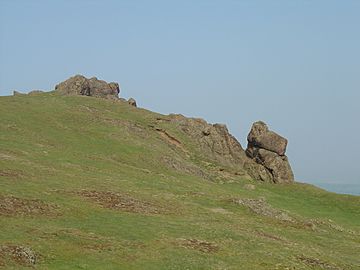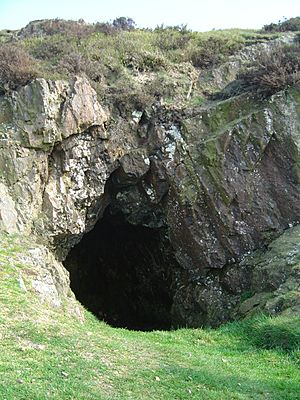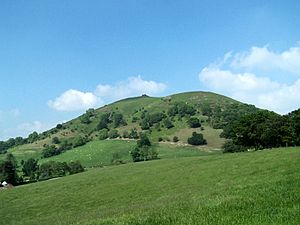Caer Caradoc facts for kids
Quick facts for kids Caer Caradoc Hill |
|
|---|---|

Caer Caradoc
|
|
| Highest point | |
| Elevation | 1,506 ft (459 m) |
| Prominence | 889 ft (271 m) |
| Listing | Marilyn |
| Naming | |
| Native name | Error {{native name}}: an IETF language tag as parameter {{{1}}} is required (help) |
| Geography | |
| Location | Shropshire, England |
| Parent range | Shropshire Hills |
| OS grid | SO477953 |
| Topo map | OS Landranger 137, 138 |
Caer Caradoc is a famous hill in Shropshire, England. Its name comes from the Welsh language, Caer Caradog, which means "Caradog's fort". This hill stands tall over the town of Church Stretton and the village of All Stretton.
From the top of Caer Caradoc, you can see amazing views. You can look north towards the Wrekin and east to Wenlock Edge. To the west, you'll see the Long Mynd. On a clear day, you might even spot hills in north-east Wales or the Malvern Hills to the south-east.
What is Caer Caradoc?
Caer Caradoc is a very distinctive hill. It rises steeply from a narrow valley called the Stretton Gap. The hill has a long, narrow shape, often described as a "whaleback ridge."
This shape is similar to the Wrekin, another hill about 10 miles (16 km) to the north-east. Caer Caradoc is the highest point on this ridge.
Climbing the Hill
You can climb Caer Caradoc from Church Stretton. The path is quite steep, so it's a good workout! If you prefer an easier climb, you can start from the village of Cardington. This village is about 2 miles (3 km) east of the hill.
Many people enjoy walking across Caer Caradoc. You can even combine it with climbs up nearby hills like Ragleth Hill and the Lawley for a longer adventure.
How the Hill Was Formed
Caer Caradoc is a very old hill. It was formed by volcanoes, just like the Wrekin and other hills in the area. It's made of strong, ancient rocks that were pushed upwards. This happened because of movements deep underground along something called the Church Stretton fault.
A fault is like a big crack in the Earth's crust. This particular fault line stretches all the way from Staffordshire to South Wales. You can sometimes see signs of this fault on maps, like lines of springs on the hill.
An Ancient Fort

At the very top of Caer Caradoc, there's an ancient hill fort. This fort was built a very long time ago, either in the Iron Age or late Bronze Age. This is why the hill is called "Caradog's fort."
Local stories say that this hill was the site of a big battle. It's believed to be where a famous ancient British leader named Caractacus made his last stand against the Roman legions. This happened during the Roman conquest of Britain. Legend says that after the battle, Caractacus hid in a small cave near the summit. While some believe this was his final battle spot, others say it was one of his strong fortresses.
See also
 In Spanish: Caer Caradoc para niños
In Spanish: Caer Caradoc para niños
 | John T. Biggers |
 | Thomas Blackshear |
 | Mark Bradford |
 | Beverly Buchanan |


